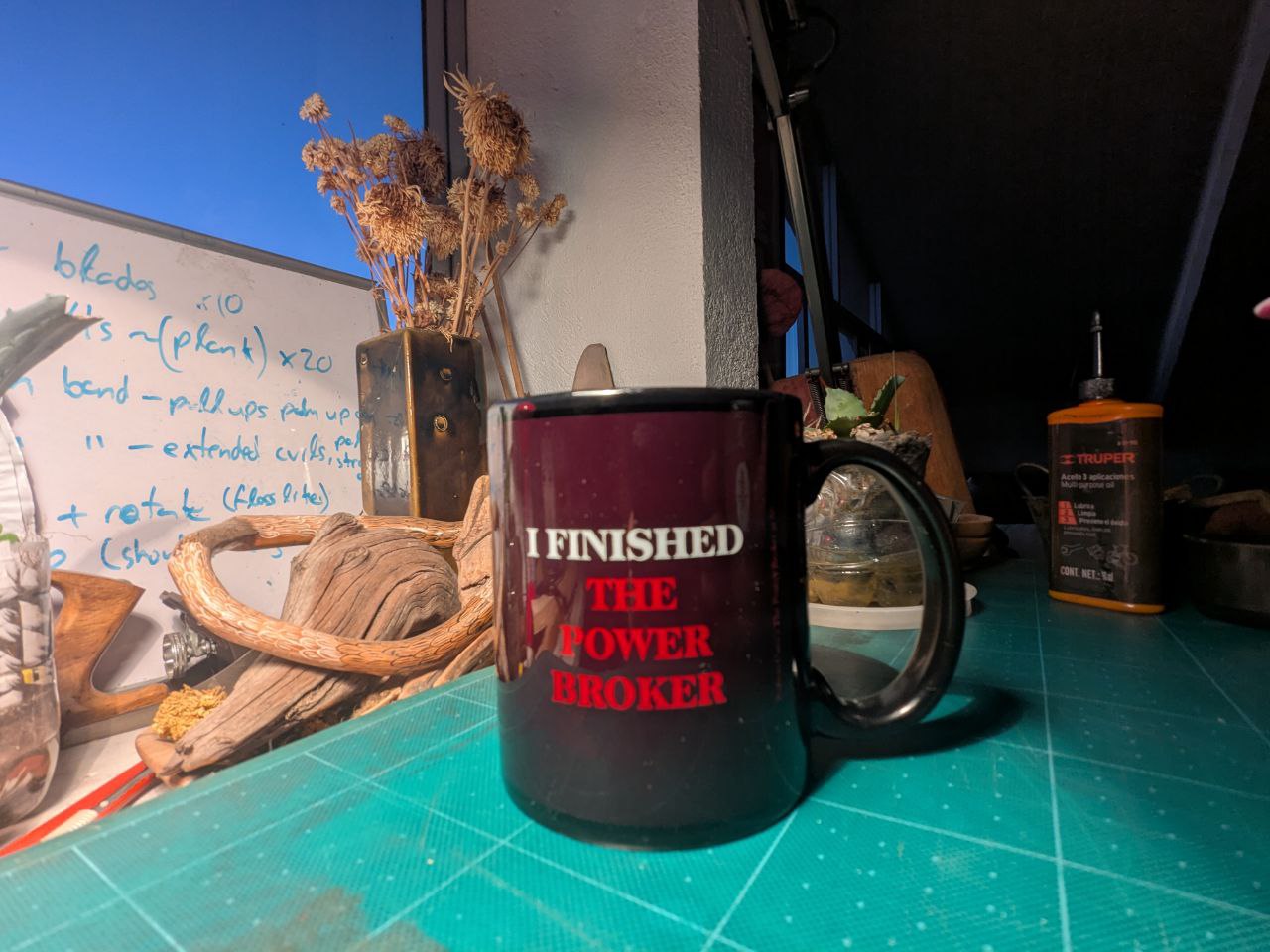Some book(s) I read in 2024
The Power Broker
The last seriously challenging book I read was The Birth of Tragedy by Friedrich Nietzche in 2019. Before that I had been on a steady diet of ghostwritten business biographies and fluff pieces - it was a dark time for the intellectual in me. I realised that the business style books were rather empty books, which were making me feel good about finishing them but were not really giving me much.
After that stage I went back to more interesting books, I gravitated towards finance, woodworking, engineering and philosophy. Read Meditations often, one of the stress reading books I always carry on my ebook, The Growth Mindset, a bunch of history books and many things about woodworking, furniture making and forestry. However, I think I was optimising for quick-ish reads and had simply not chosen a truly long, challenging book. And so it was that in January 2024 I found out Roman Mars from 99% Invisible was creating a book club for The Power Broker and even though I did not know anything about Robert Moses, Robert Caro or The Power Broker I bought my copy and committed myself to reading this 1,200 page brick.
“So we’re going to spend 2024 reading it together. We’re going to study it. We’re going to break it down. We’re going to revel in the genius of its author, Robert Caro. We’re going to shake our fists in the sky at Robert Moses. It is going to be amazing.”
Quoted from 99pi’s website here: https://99percentinvisible.org/episode/breaking-down-the-power-broker/
I was quick to assemble a posse of fellow boffins and we created a chat group to talk about the subject and discuss both the book and the 12 podcasts that were to accompany it. I had never been part of a book club and I must say I really enjoyed the experience, it was really something special to connect with friends over literature.
The book won Robert Caro a Pulitzer Price and was published in 1974 so that in 2024 we were celebrating the 50 year anniversary. There is/was even an exhibit in NY commemorating the landmark.
Seventy countries held elections in 2024, about 50% of the global population held national elections including Mexico and the USA. It was enlightening to read a book so instructive about politics during this global climate, it made me understand how the political machine works and a lot about how the government and city officials can impact a city and a country.
Robert Moses (RM in short as his team called him) built parks, roads (about 1500kms of them), dams and housing - he poured more concrete and moved more earth than any single person ever has. He did not study engineering but became an engineer of sorts. The roads he built prioritised private cars by design and in execution, so that no mass transit or even buses could drive on them: having bridges shorter than the average bus to make sure of that. The areas around these roads, empty land at the time of construction, grew into sprawling suburban sites that were not dense enough to support public transport hubs. All other mass transit options were to prove too expensive for the city after that. RM condemned the people in NY to suffer horrible traffic for generations, it made apartments that were close to public transport scarce and thus extremely expensive today.
RM held powerful and influential positions from 1924 to 1968 - positions that defined who got multimillion contracts and ultimately, votes. None of these positions were elected positions, which made them all the more powerful as he could not be voted out of them. At points his power over was so complete that few people in the country could challenge him, at some point it takes none other than FDR (as sitting president) to stop him from demolishing Castle Clinton at Battery Park. Governors and Mayors came and went, RM stayed. He stayed because he wrote the legislation that defined his positions.
As head of the Triborough Bridge Authority that had control of the NYC Housing Authority he displaced hundreds of thousands of families and tore apart many beautiful, walkable neighbourhoods to build his roads, in so doing prioritising cars over humans again and again. Having lived in NY and CDMX I can say that this was objectively the wrong priority. Furthermore it’s not just the people he displaced, it’s how violently he displaced the most vulnerable populations of the city, with constant contempt for the non-white.
I admire his “get things done” mindset and really admire how he navigated and overcame the challenges he faced. He is probably the last person in NY or any major inhabited city in the west that will get to build on that scale - yet he became corrupt and sick with power. He could’ve used this power and corruption for the betterment of our world but he did not. If he had been a bit data driven he might have understood, perhaps by the end of WWII, that his roads were never going to be enough. That even if he did manage to bring all of the cars to the city there would be no room for humans left. Were he open to change, to learn and to grow he might have seen the obvious signs around him that would show him how to best serve his city and his country, not just his dreams.
 Thanks to my fellow geek and friend Enrique V for this mug.
Thanks to my fellow geek and friend Enrique V for this mug.